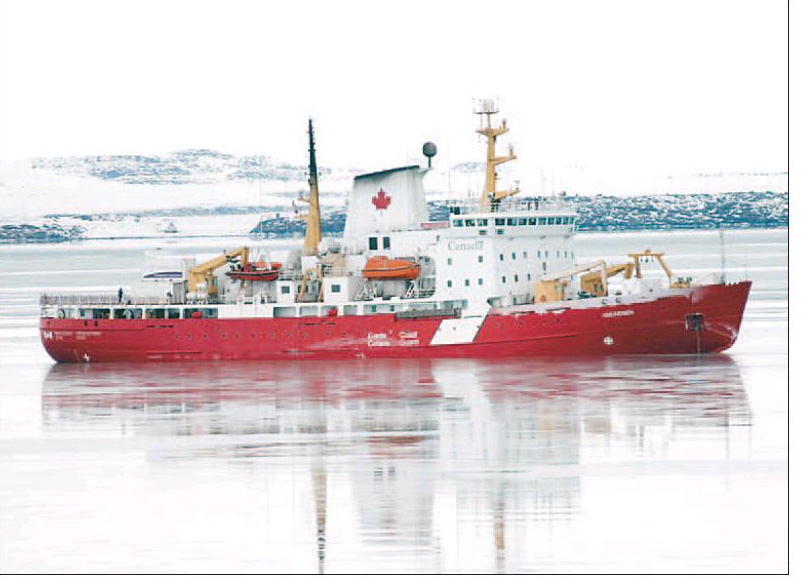‘We may have reached that tipping point,’ says lead author of new research paper published in Science
Margaret Munro
Sun

Canadian coast guad icebreaker Amindsen will ower-winte in the Beaufort Sea as a lab and base camp for 200 scientists and inuit, to get an even better read on the ice.
The meltdown in the Arctic may have reached a tipping point that could trigger a cascade of climate changes and profoundly affect the weather in Earth’s temperate regions, a new study warns.
“When the ice thins to a vulnerable state, the bottom will drop out and we may quickly move into a new, seasonally ice-free state of the Arctic,” says Mark Serreze, a senior researcher at the National Snow and Ice Data Center at the University of Colorado at Boulder and lead author of the study published in the journal Science today.
“I think there is some evidence that we may have reached that tipping point, and the impacts will not be confined to the Arctic region.”
The Science paper, Perspectives on the Arctic’s Shrinking Sea Ice Cover, pulls together recent research and observations and leaves little question the Arctic ice is shrinking. It says the trend in Arctic sea ice extent, which is defined as the total area where ice covers at least 15 per cent of the ocean surface, has been “negative” every month since satellite record keeping began in 1979.
The scientists attribute the ice loss to “strong natural variability” combined with rising concentrations of greenhouse gases that are being pumped into the atmosphere.
The extent of ice in September 2005 was the lowest on record in at least 50 years, and the scientists say “data for the past few years suggest an accelerating decline in winter sea-ice extent.”
“With this increasing vulnerability, a kick to the system just from natural climate fluctuations could send it into a tailspin,” Serreze says in a release issued with the study.
The impacts are already evident in the Arctic, where the increasing open water has accelerated coastal erosion and made the ice increasingly unpredictable for hunters.
But, this is just the start of what the scientists suggest will be far-reaching effects. One climate model suggests the loss of Arctic ice could reduce severity of Arctic cold fronts dropping into western North America and dump less snow and rainfall that agriculture and ski operators depend on.
Another model predicts storm tracks in the mid-latitudes could intensify, sending more precipitation into western and southern Europe.
The scientists also raise the spectre of Arctic ice melt contributing to disruption of the global thermohaline circulation, “possibly with far-reaching consequences.” The thermohaline currents snake around the world’s oceans carrying massive amounts of heat from the tropics north, warming the eastern U.S. and Europe.
“Just how things will pan out is unclear,” says Serreze, “but the bottom line is that Arctic sea ice matters globally.”
The paper says there are plenty of wild cards in the models and forecasts for the Arctic. But it concludes “given the growing agreement between models and observations, a transition to a seasonally ice-free Arctic Ocean as the system warms seems increasingly certain.”
A chorus of scientists have been raising the alarm over the Arctic ice in recent years. Some now predict the Arctic could be ice-free in summer as early as 2030, with the polar ice cap vanishing for the first time in a million years. “It’s a remarkable change in a very short period of time,” David Barber, an ice specialist at the University of Manitoba, said in a recent interview.
Barber is co-leader of one of the more ambitious projects aiming to get a better read on what’s happening to the ice as part of the international polar year, which has just started. The Canadian coast guard icebreaker Amundsen will over-winter in the Beaufort Sea next year and serve as a floating lab and base camp for rotating teams of 200 scientists from 14 countries, as well as Inuit who are participating in the project.

